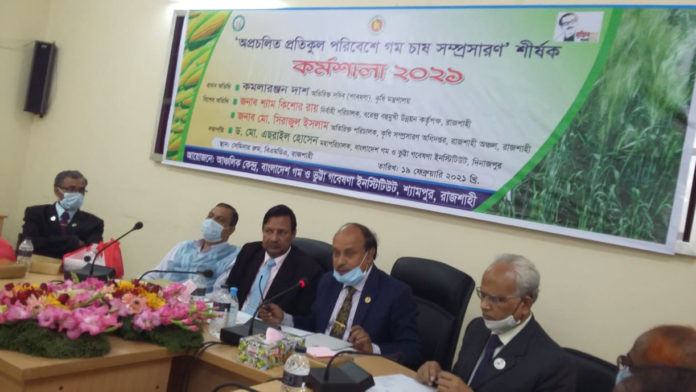RAJSHAHI, Feb 19, 2021 (BSS)- Substantial and sustainable expansion of
wheat farming can mitigate the existing stressed environment in the high
Barind tract as wheat is an environment friendly crop, researchers and
scientists here said.
Time has come to enhance acreage of wheat farming instead of only
depending on Irri-boro rice in the dried area to ensure food security amid
the adverse impact of climate change and Covid-19 pandemic.
They came up with the observation while addressing a regional workshop
styled “Wheat Farming Extension in Non-conventional Stressed Environment” in
Rajshahi city today.
Regional Station of Bangladesh Wheat and Maize Research Institute (BWMRI)
hosted the workshop at the conference hall of Barind Multipurpose Development
Authority (BMDA). More than 50 agricultural extension and research
organizations and other stakeholders joined the workshop.
Additional Secretary (Research) to the Ministry of Agriculture
Komolaranjan Dash and BMDA Executive Director Shayam Kishore Roy addressed
the meeting as chief and special guests respectively with BWMRI Director
General Dr Israil Hossain in the chair.
BWMRI Principal Scientific Officer Dr Ilias Hossain welcomed the
participants.
Director of Bangladesh Sugar Crop Research Institute Dr Samajit Kumar
Paul, Additional Director of the Department of Agriculture Extension Sirajul
Islam and BMDA Superintending Engineer Abdur Rashid also spoke.
On the occasion, BWMRI Senior Scientific Officer Dr Mahfuz Bazzaj
presented a keynote paper on the topic giving an overview of the country’s
present condition of wheat farming along with its challenges and prospects.
In his remarks, Komolaranjan Dash suggested development and dissemination
of appropriate farm machinery like power tiller operated seeder, strip till
and zero till, bed planter, reaper and thresher to enhance the wheat farm
production.
He said promotion of modern technologies in wheat farming could be the
effective means of boosting wheat yield as a whole.
Disseminating ideas of modern technologies among the field level
agricultural officials and farmers on how to expand the wheat cultivation in
the drought-prone area has become indispensable.
Shayam Kishore Roy said wheat plays an important role to ensure food
security as its consumption is increasing day by day. But, Bangladesh
produces hardly 12 lakh tonnes of wheat against the demand of around 70 lakh
tonnes annually.
He, however, said the Rajshahi region contributes 35 percent of total area
and 44 percent of total production. Not only that, there are around 50,000
hectares of more rain fed land in the high barind area and there has been a
bright prospect of bringing the huge land under wheat cultivation.
More emphasis should be given on expansion of short duration and high-
yielding wheat varieties. Seed preservation and production training need to
be strengthened.
GO-NGO collaboration has become an urgent need for the new variety
expansion. More support from international research organizations including
CIMMYT has become required for germ-plasm especially heat- tolerant variety
adoption together with yield gap minimization in the farmers field.
He recommended minimising the constraints for the sake of sustainable
wheat production. Farmers needed to be aware about the resource conserving
technologies and modern scientific methods so that wheat production remained
technologically sound, economically viable, socially acceptable and
environmentally secure.



